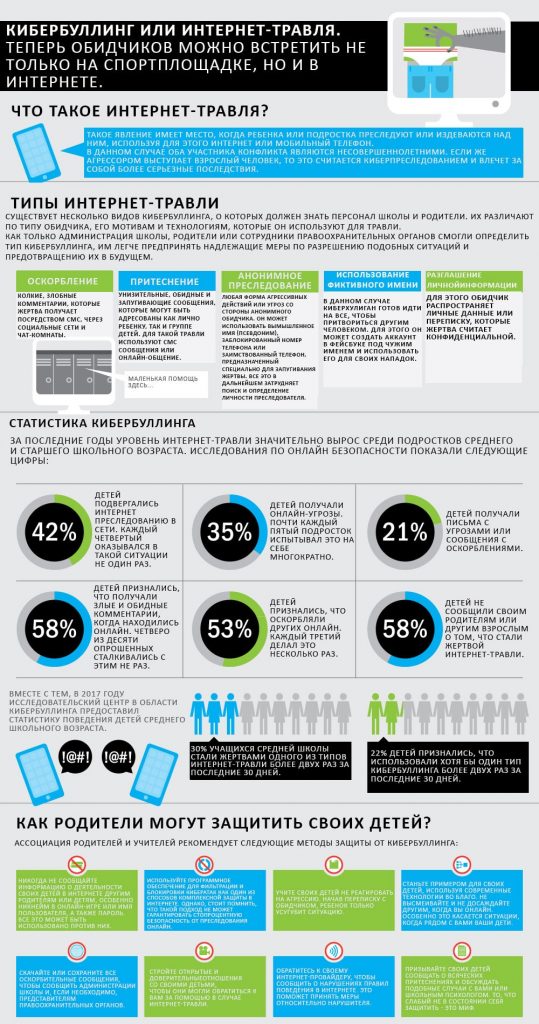Кибербуллинг или Интернет-травля. Теперь обидчиков можно встретить не только на спортплощадке, но и в Интернете
Что такое кибербуллинг или Интернет-травля?
Такое явление имеет место, когда ребенка или подростка преследуют или издеваются над ним, используя для этого Интернет или мобильный телефон. В данном случае оба участника конфликта являются несовершеннолетними. Если же агрессором выступает взрослый человек, то это считается киберпреследованием и влечет за собой более серьезные последствия.
Типы Интернет-травли
Существует несколько видов кибербуллинга, о которых должен знать персонал школы и родители. Их различают по типу обидчика, его мотивам и технологиям, которые он используют для травли. Как только администрация школы, родители или сотрудники правоохранительных органов смогли определить тип кибербуллинга, им легче предпринять надлежащие меры по разрешению подобных ситуаций и предотвращению их в будущем.
Оскорбление
Колкие, злобные комментарии, которые жертва получает посредством СМС, через социальные сети и чат-комнаты.
Притеснение
Унизительные, обидные и запугивающие сообщения, которые могут быть адресованы как лично ребенку, так и группе детей. Для такой травли используют СМС сообщения или онлайн-общение.
Анонимное преследование
Любая форма агрессивных действий или угроз со стороны анонимного обидчика. Он может использовать вымышленное имя (псевдоним), заблокированный номер телефона или заимствованный телефон, предназначенный специально для запугивания жертвы. Все это в дальнейшем затрудняет поиск и определение личности преследователя.
Использование фиктивного имени
В данном случае киберхулиган готов идти на все, чтобы притвориться другим человеком. Для этого он может создать аккаунт в Фейсбуке под чужим именем и использовать его для своих нападок.
Разглашение личной информации
Для этого обидчик распространяет личные данные или переписку, которые жертва считает конфиденциальной.
Статистика кибербуллинга
За последние годы уровень Интернет-травли значительно вырос среди подростков среднего и старшего школьного возраста. Исследования по онлайн безопасности показали следующие цифры:
- 42% детей подвергались Интернет преследованию в сети. Каждый четвертый оказывался в такой ситуации не один раз.
- 58% детей признались, что получали злые и обидные комментарии, когда находились онлайн. Четверо из десяти опрошенных сталкивались с этим не раз.
- 35% детей получали онлайн-угрозы. Почти каждый пятый подросток испытывал это на себе многократно.
- 53% детей признались, что оскорбляли других онлайн. Каждый третий делал это несколько раз.
- 21% детей получали письма с угрозами или сообщения с оскорблениями.
- 58% детей не сообщили своим родителям или другим взрослым о том, что стали жертвой Интернет-травли.
Вместе с тем, в 2017 году Исследовательский центр в области кибербуллинга предоставил статистику поведения детей среднего школьного возраста.
- 30% учащихся средней школы стали жертвами одного из типов Интернет-травли более двух раз за последние 30 дней.
- 22% детей признались, что использовали хотя бы один тип кибербуллинга более двух раз за последние 30 дней.
Как родители могут защитить своих детей?
Ассоциация родителей и учителей рекомендует следующие методы защиты от кибербуллинга:
- Никогда не сообщайте информацию о деятельности своих детей в Интернете другим родителям или детям, особенно никнейм в онлайн-игре или имя пользователя, а также пароль. Все это может быть использовано против них.
- Используйте программное обеспечение для фильтрации и блокировки кибератак как один из способов комплексной защиты в Интернете. Однако, стоит помнить, что такой подход не может гарантировать стопроцентную безопасность от преследования онлайн.
- Учите своих детей не реагировать на агрессию. Начав переписку с обидчиком, ребенок только усугубит ситуацию.
- Станьте примером для своих детей, используя современные технологии во благо. Не высмеивайте и не досаждайте другим, когда вы онлайн. Особенно это касается ситуации, когда рядом с вами ваши дети. Будьте для них примером для подражания.
- Скачайте или сохраните все оскорбительные сообщения, чтобы сообщить администрации школы и, если необходимо, представителям правоохранительных органов.
- Стройте открытые и доверительные отношения со своими детьми, чтобы они могли обратиться к вам за помощью в случае интернет-травли.
- Обратитесь к своему Интернет-провайдеру, чтобы сообщить о нарушениях правил поведения в Интернете. Это поможет принять меры относительно нарушителя.
- Призывайте своих детей сообщать о всяческих притеснениях и обсуждать подобные случаи с вами или школьным психологом. То, что слабый не в состоянии себя защитить – это миф.
Эксперт в области интернет-маркетинга. Руководитель маркетингового агентства MAVR.
Бизнес-степень «Мастер делового администрирования» (MBA).


